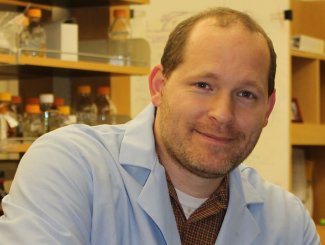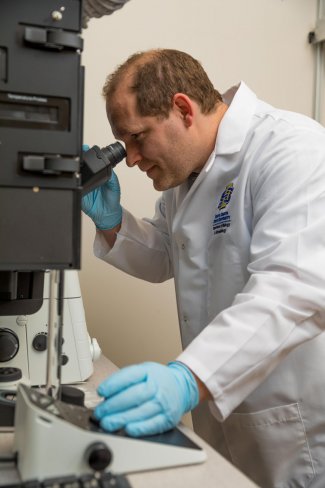Nicholas Butzin, assistant professor in South Dakota State University's Department of Biology and Microbiology, has been awarded a five-year, $1.3 million grant through the National Science Foundation's Faculty Early Career Development Program.

The NSF CAREER award, one of NSF's most prestigious awards, supports early-career faculty members "who have the potential to serve as academic role models in research and education and to lead advances in the mission of their department or organization."
"We are delighted that Dr. Butzin's cutting-edge research ideas are getting recognized and rewarded at the national level," said Sen Subramanian, associate dean for research for SDSU's College of Natural Sciences. "This unique and prestigious award would not only help Dr. Butzin discover fundamental biological mechanisms about how bacteria respond to stress (to help develop better antibiotics), but also bring a culture of research-based learning into his classes. The award is a prime example of how our college's research profile can grow in synergy with our educational mission.”
Butzin, who has been with SDSU since 2017, will continue his research related to microbial systems using an evolutionary perspective and synthetic biology. For this specific grant, he is looking to investigate and gain a greater understanding of bacterial cells that can survive a level of stress—known as "persisters."
"The goal of this project is to discover the mechanisms that allow the formation, maintenance and survival of bacterial persisters," Butzin said. "This will help to understand key features of bacterial survival."
For example, most cells in a bacterial population die when exposed to a major stress, such as antibiotics, but a small fraction of cells survive for a long time. These persisters appear to result from variability in cell behaviors across the population.
As Butzin explains, gaining a greater understanding of persisters will help further research in medical and environmental fields.

"The research will produce a quantitative framework for understanding the mechanism responsible for the phenotypic heterogeneity thought to serve as an inherent survival strategy of bacteria," Butzin said. "This work will impact fundamental knowledge of how bacteria survive sudden lethal stress and how they deal with harsh environmental fluctuations. The results are expected to offer new insights into the fundamental molecular mechanisms of how cells revive from lethal stress."
"Dr. Nicholas Butzin's NSF CAREER award is a testament of his scientific achievements and recognition in the field of 'persisters' biology," said Radhey Kaushik, head of SDSU's Department of Biology and Microbiology. "It is a matter of great excitement and pride for the Department of Biology and Microbiology. This award will allow Dr. Butzin to add several undergraduate and graduate students to his already busy lab and provide them with excellent research training opportunities. I am sure Dr. Butzin will accomplish a few cutting-edge scientific milestones through this CAREER award."
Prior to this NSF award, Butzin had been hosting workshops for K-12 science teachers in the region to help them integrate synthetic biology modules into their classrooms. Butzin will continue—and build upon—the workshops through this grant.
"We have found that we can reach more students if we educate the teachers rather than teaching the students," Butzin said. "They can then take what they learned and apply it their own classrooms."
Both graduate and undergraduate students will play a role in the research portion of the grant, as well as the ongoing professional development workshops.
- Contact:
- Telephone number: 605-688-6161
Republishing
You may republish SDSU News Center articles for free, online or in print. Questions? Contact us at sdsu.news@sdstate.edu or 605-688-6161.

